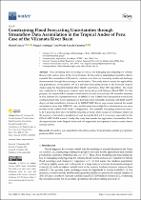Constraining Flood Forecasting Uncertainties through Streamflow Data Assimilation in the Tropical Andes of Peru: Case of the Vilcanota River Basin
Fecha
2023-11Colecciones
- Artículo científico [176]
Resumen
Flood modeling and forecasting are crucial for managing and preparing for extreme flood events, such as those in the Tropical Andes. In this context, assimilating streamflow data is essential. Data Assimilation (DA) seeks to combine errors between forecasting models and discharge measurements through the updating of model states. This study aims to assess the applicability and performance of streamflow DA in a sub-daily forecasting system of the Peruvian Tropical Andes using the Ensemble Kalman Filter (EnKF) and Particle Filter (PF) algorithms. The study was conducted in a data-sparse Andean basin during the period February–March 2022. For this purpose, the lumped GR4H rainfall–runoff model was run forward with 100 ensemble members in four different DA experiments based on IMERG-E and GSMaP-NRT precipitation sources and assimilated real-time hourly discharges at the basin outlet. Ensemble modeling with EnKF and PF displayed that perturbation introduced by GSMaP-NRT’-driven experiments reduced the model uncertainties more than IMERG-E’ ones, and the reduction in high-flow subestimation was more notable for the GSMaP-NRT’+EnKF configuration. The ensemble forecasting framework from 1 to 24 h proposed here showed that the updating of model states using DA techniques improved the accuracy of streamflow prediction at least during the first 6–8 h on average, especially for the GSMaP-NRT’+EnKF scheme. Finally, this study benchmarks the application of streamflow DA in data-sparse basins in the Tropical Andes and will support the development of more accurate climate services in Peru.








